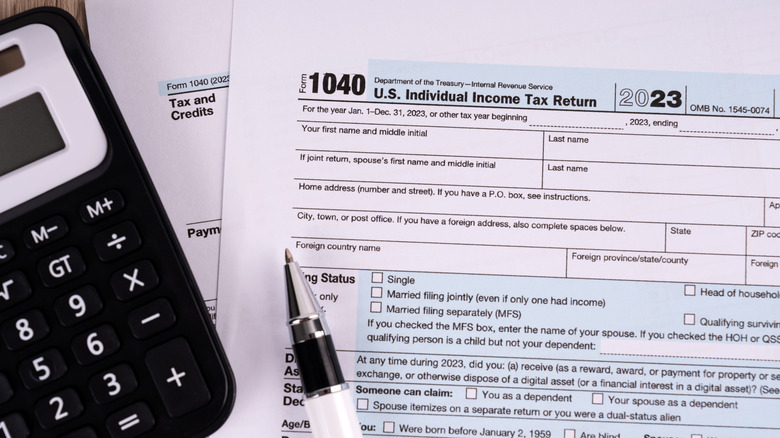The Unexpected Way Your Passport Can Be Taken From You, According To The IRS
There are a bunch of things to consider when dealing with passports, like when to renew them, how best to dress for your passport photo, or whether it's worth getting a passport cover. What you may not know is that there are reasons your passport can be taken away from you. According to the Internal Revenue Service (IRS), you may lose your passport or not be able to apply or renew if you haven't paid your taxes. While you should be paying them every year, if you've been in arrears, you might be freaking out right now. Pause and take a deep breath. There is a high threshold for the amount of tax debt that qualifies you for this penalty, and there are really important exceptions, like bankruptcy, for instance. It's also unlikely for your passport to be revoked immediately. That said, you should take this seriously if you have outstanding tax debt and plan to take an overseas trip in the near future.
According to a LendEDU report, the average U.S. tax debt as of 2019 was $16,849, which is well below the amount that can cause this issue. The IRS considers "seriously delinquent tax debt" to be amounts totaling over $62,000 at the time of this writing, including penalties and interest. (That can change each year.) However, if that debt includes child support, you're experiencing hardship, you've made arrangements with the IRS to pay in installments, you're in bankruptcy, you're in a federally declared disaster area, or you fall under another protected category (all of which you can see here), your debts may not be considered seriously delinquent.
How owing the IRS can get your passport taken away
If you owe a large sum of tax debt, passport revocation won't happen overnight. The IRS must file a Notice of Federal Tax Lien with the State Department first. However, once the State Department gets the notice, they cannot issue you a passport, and the one you have may be revoked. Note that it can be taken away from you, even if you're currently overseas. If that happens, you may be issued a limited-validity passport to get you directly home. It also won't occur without notice. You will first get a letter, and if you're in the process of applying for a new passport card or book, the State Department will hold your application for 90 days from the date of the letter.
So what do you do if you have a "seriously delinquent tax debt" over the threshold and your passport is denied or revoked? You can contact the IRS to pay what you owe or set up payment arrangements to get the penalty reversed. (Even if you need a U.S. passport for your job, you still have to do this.) If this happens to you, the best thing to do is contact the IRS immediately, and, if needed, a lawyer or tax expert to help you navigate the situation. If you have an international trip coming up in the next 45 days, the IRS may be able to speed up processing for payments or payment arrangements so you don't miss it. You'll have to provide proof of travel, like your plane reservations, cruise ticket, or hotel reservations, as well as the letter from the State Department that denied your application or revoked your passport.

